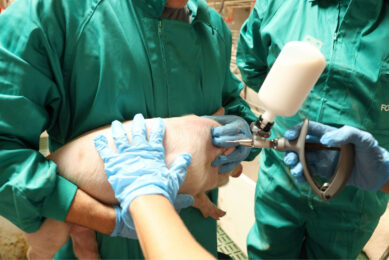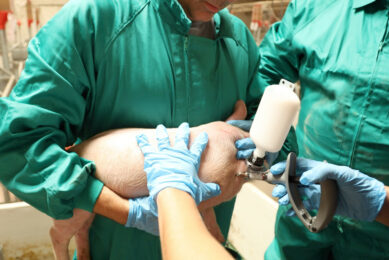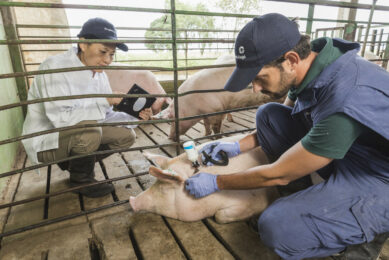Pig symposium confirms benefits of PCV2 vaccination
Papers presented at the 3rd European symposium on Porcine health management in Espoo, Finland have confirmed the benefits of both sow and piglet vaccination against PCV2.
Ricardo Neto, Merial Animal Health’s swine veterinary advisor, said: “The papers presented and published in this symposium reinforced the view that we need to continue to be vigilant against PCV2, and taking the appropriate measures can deliver a wide range of economic benefits. These include improved average daily weight gains and mortality for piglets, as well as prevention of reproductive problems caused by PCV2.”
A study undertaken by UK vet Jake Waddilove comparing two different PCV2 vaccines for piglets including Circovac, which has recently been licensed in the UK for piglets as well as sows, was published in Finland. The trial was conducted on a 750 sow farrow-to-finish unit in Eastern England with a high disease burden including PCVD. It demonstrated that there was no significant difference in the growth rates and mortality levels between piglets vaccinated with 0.5ml of Circovac and those vaccinated with 1 ml of an alternative vaccine.
Similar research in Portugal, comparing Circovac vaccination of piglets with piglet vaccination with an alternative licensed PCV2 vaccine looked at two groups of 740 piglets between weaning and slaughter. Both groups were vaccinated against PCV2, one with Circovac and the other with an alternative vaccine. Both groups show improved mortality rates compared to those experienced before the vaccination programme. The mortality rates and carcase weights for the group vaccinated with Circovac were marginally better than the other group.
A study of over 27,000 piglets across five farms in Spain to assess the impact of PCV2 control in these units, demonstrated the positive effects of PCV2 vaccination using Circovac. Improvements included decreases in mortality rates at different stages of the rearing process, even when the disease was present sub-clinically, as well as reduction in the number of runts.
Research was also carried out on piglets from a 1200 sow herd in an integrated system in Spain. The unit had experienced wasting and respiratory diseases in both weaners and fatteners, in spite of having implemented exhaustive PRRS control measures. A total of 44 batches of fatteners were followed, and assessed with or without PCV2 vaccination being implemented. The results were dramatic with mortality in the vaccinated piglets falling from 16.1% to 6.5% and also very significant reductions of the FCR by 9% and the cost of medication per kg of pig produced.
In Italy a study showed that sow vaccination also significantly lowered mortality rates. The study, conducted on a 170 sow farrow-to-finish farm, demonstrated that mortality among the vaccinated piglets was only 2.42% compared to 7.82% among the non-vaccinated piglets.
Research from Italy presented at the symposium clearly showed that PCV2 immunity is transmitted from vaccinated sows to piglets. Bulgarian research supported the potential for improvements in reproduction parameters recently demonstrated by research in Germany, France and the UK. Significant differences in a number of parameters in the study of a 2700 sow farrow-to-finish unit were noted in returns, conception rates, farrowing, the number of stillborn piglets per litter and the number of piglets weaned per litter.
Ricardo Neto said: “This wealth of information supports the research previously published which demonstrates that PCV2 control helps to keep pig production profitable, as well as improving animal welfare and health. It helps producers and veterinary surgeons to design herd health plans, as it also shows the benefits of an effective PCV2 control on reproduction, something that can be only achieved through sow vaccination.”











